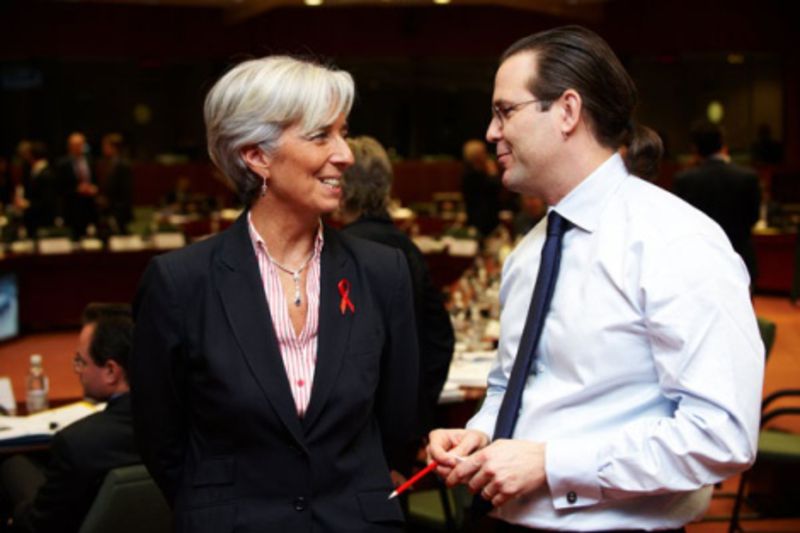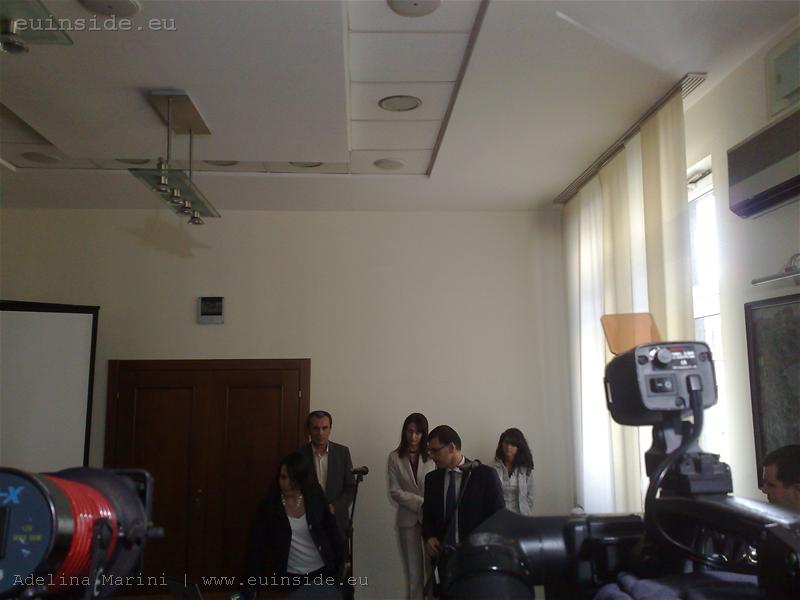The foreign policy in the election platforms of Bulgarian parties. The DPS introduced entirely new national security strategy
Adelina Marini, June 24, 2009
Foreign policy is not one of the most attractive to the voter subjects but moments like the last few weeks after the presidential elections in Iran show that foreign policy is something that matters and it matters a lot. If we remind ourselves also the case with the Bulgarian medics in Libya which showed many of the transitional weakness of Bulgaria, now as a member of the EU, foreign policy is to a large extent complied with the European one, but not entirely. In fact, the current foreign minister of Bulgaria Ivaylo Kalfin is the first to put the foreign policy in the context of economic interests and this is how it has to be. But what do the political parties which compete for a place in the 41st National Assembly put in their programmes as foreign policy priorities? After all they are supposed to take important decisions when they send MPs to Parliament. Unfortunately, the specific ideas and proposals are not many with some exceptions. And the DPS (The Movement for rights and freedoms, perceived as representing the Turkish minority in Bulgaria) with any public noise published on its Internet site its brand new Strategy for national security.
 We start again with GERB (Citizens for the European Development of Bulgaria) because, according to the latest opinion polls, it is going to be first at the upcoming Parliamentary elections on the 5th of July. This is one of the parties that is quite thrifty and has put its priorities in general without any details. The first and main priority is the presence of Bulgaria at the centre of European politics, whatever that might mean. GERB also wants to turn Bulgaria into a factor for the democratic stability and the development of the Balkans and the Black sea region, which is good, because it will actually continue the current foreign policy of Bulgaria.
We start again with GERB (Citizens for the European Development of Bulgaria) because, according to the latest opinion polls, it is going to be first at the upcoming Parliamentary elections on the 5th of July. This is one of the parties that is quite thrifty and has put its priorities in general without any details. The first and main priority is the presence of Bulgaria at the centre of European politics, whatever that might mean. GERB also wants to turn Bulgaria into a factor for the democratic stability and the development of the Balkans and the Black sea region, which is good, because it will actually continue the current foreign policy of Bulgaria.
GERB will also pay attention to the development and integration of the Bulgarian communities abroad. In fact GERB have created an alternative strategy for the Bulgarians abroad which they presented almost in the same time when the government presented its own a year ago.
 The BSP (Bulgarian Socialist Party) have much more ideas in the foreign policy field which is due to the fact that the ministry of foreign affairs comes from their ruling quota and he led a very successful foreign policy. The socialists propose the EU to engage with passing to the next level of the cooperation with the Black Sea region taking the example of the Mediterranean union as well as with drawing Russia and Turkey into realisation of common policies. In fact, with its accession to the EU Bulgaria participated actively in the development of the Black Sea Synergy of the EU which has been this year incorporated into the Eastern Partnership initiative with main goal - enhancing the partnership of the EU with its Black sea neighbours.
The BSP (Bulgarian Socialist Party) have much more ideas in the foreign policy field which is due to the fact that the ministry of foreign affairs comes from their ruling quota and he led a very successful foreign policy. The socialists propose the EU to engage with passing to the next level of the cooperation with the Black Sea region taking the example of the Mediterranean union as well as with drawing Russia and Turkey into realisation of common policies. In fact, with its accession to the EU Bulgaria participated actively in the development of the Black Sea Synergy of the EU which has been this year incorporated into the Eastern Partnership initiative with main goal - enhancing the partnership of the EU with its Black sea neighbours.
The BSP will also stand for the strengthening of a multilateral cooperation in South East Europe for strengthening of the European model of cooperation and enhanced preparation of the Western Balkans for EU and NATO membership. For the last 4 years Bulgaria presided for a year each time several regional initiatives which proved that there are opportunities for broader multilateral cooperation, especially when there are common goals. Many times the Baltic states had been given as an example for full integration of markets and policies which might be implemented in the Balkans.
Non-surprisingly the socialists intend to maintain their strategic partnership with the US as in the same time they want to energize the relations with Russia. This policy, although it has quite comprehensive arguments, proved to be not quite winning for the last 4 years.
 The Blue coalition will also stand for the development of the Eastern Partnership but they think that this would be done better in partnership with Romania. In fact, at a European level, Romania and Bulgaria competed vehemently on the issue which country contributed most to the Black Sea Synergy. The Blue coalition also want to renew the efforts for the creation of a Stability Pact for the South Caucasus similar to that for the Balkans, that had worked for 20 years. The Coalition also has a vision about the relations of Bulgaria with Serbia. They intend to support Serbia's pro-European course but if Belgrade would guarantee the rights of the Bulgarian minority there, among which the right of leading a liturgy in Bulgarian language.
The Blue coalition will also stand for the development of the Eastern Partnership but they think that this would be done better in partnership with Romania. In fact, at a European level, Romania and Bulgaria competed vehemently on the issue which country contributed most to the Black Sea Synergy. The Blue coalition also want to renew the efforts for the creation of a Stability Pact for the South Caucasus similar to that for the Balkans, that had worked for 20 years. The Coalition also has a vision about the relations of Bulgaria with Serbia. They intend to support Serbia's pro-European course but if Belgrade would guarantee the rights of the Bulgarian minority there, among which the right of leading a liturgy in Bulgarian language.
The Blue coalition has a very interesting position with regard to the Turkish accession to the EU: "We shall put the European perspective of Turkey depending on Ankara's refusal to interfere in Bulgarian political life by supporting political parties", is written in the pre-election programme of the Blue coalition.
And with regard to the Bulgarians abroad, the Blue coalition intends to stand for the introduction of e-voting, final solution to the issue with their health insurances and many other specific ideas which can be read in their election platform.
 The Bulgarian Greens also focus on South East Europe as one of their priorities in the foreign policy. They will also insist the economic interests not to lead the diplomacy and, instead, the human rights to be leading in the Bulgarian foreign policy. The Bulgarian Greens will quite quickly find allies in the EU because they intend to block the construction of new nuclear power stations in Europe and will insists the money for them to be transferred toward Renewable energy sources.
The Bulgarian Greens also focus on South East Europe as one of their priorities in the foreign policy. They will also insist the economic interests not to lead the diplomacy and, instead, the human rights to be leading in the Bulgarian foreign policy. The Bulgarian Greens will quite quickly find allies in the EU because they intend to block the construction of new nuclear power stations in Europe and will insists the money for them to be transferred toward Renewable energy sources.
The NDSV (The National Movement for Stability and Progress of the ex tsar Simeon Saxecobourggotta) have not devoted a separate chapter to the foreign policy in their programme.
 The biggest surprise is the DPS (The Movement for Rights and Freedoms, perceived as representing the Turkish minority in Bulgaria) because this is the party that does not like public activity and without any media attention has published on its Internet site entirely new Strategy for the development of the national security and defense for the period 2009-2013. The document is very serious and proposes some quite fundamental changes in the field of intelligence. In its strategy the DPS propose the creation of Strategic Intelligence which will acquire information, necessary to form policy or military strategy on national and international level. They also propose Human Intelligence. It will acquire and process information from people and newly uncovered sources, from the local administration and the population, from international and non-government organisations etc., that will serve for international operations (under the command of NATO or in a coalition).
The biggest surprise is the DPS (The Movement for Rights and Freedoms, perceived as representing the Turkish minority in Bulgaria) because this is the party that does not like public activity and without any media attention has published on its Internet site entirely new Strategy for the development of the national security and defense for the period 2009-2013. The document is very serious and proposes some quite fundamental changes in the field of intelligence. In its strategy the DPS propose the creation of Strategic Intelligence which will acquire information, necessary to form policy or military strategy on national and international level. They also propose Human Intelligence. It will acquire and process information from people and newly uncovered sources, from the local administration and the population, from international and non-government organisations etc., that will serve for international operations (under the command of NATO or in a coalition).
For the DPS the main global challenges are information technologies and, more specifically, the opportunities they give for the spreading of religious extremism. Beside this, the movement of Ahmed Dogan consider important the introduction of optic-electronic intelligence and electronic intelligence. The DPS says that everything included in their Strategy will be a priority of their future parliamentary group.
"The security environment of Bulgaria is under the influence of the instability of some parts of the Western Balkans, the conflicts in the Middle East, the Caucasus, Central Asia and Northern Africa", is another assessment in the strategy of the DPS.
 | © Consilium
| © Consilium | © euinside
| © euinside